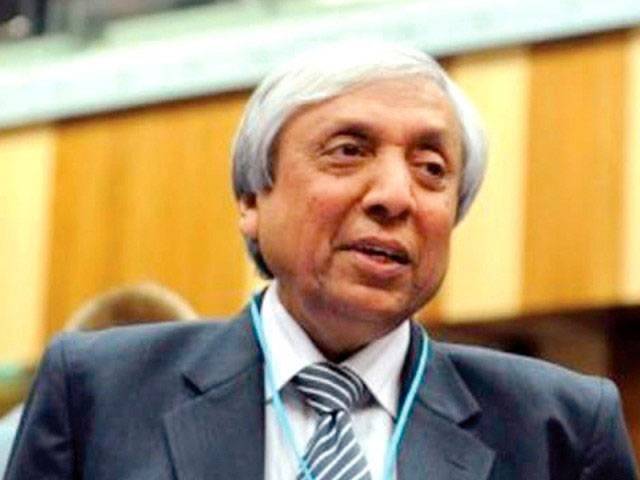ISLAMABAD - Chairman of the Pakistan Atomic Energy Commission (PAEC) Dr Ansar Parvez Wednesday said that the PAEC had been planning to expand its nuclear power programme to overcome energy crisis in the country.
He was addressing the 57th International Atomic Energy Agency (IAEA) General Conference, which is in progress in Vienna, Austria from September 16-20, said a message received here.
Dr Ansar said “Overcoming the energy crisis is these days an issue of the highest priority for our nation. With our very limited accessible conventional energy sources, nuclear power has to form an integral part of our energy portfolio.”
He said that Pakistan had a very productive and mutually beneficial relationship with the agency and that Pakistan wanted to further deepen this cooperation.
“In Pakistan, we are using nuclear technology in many areas that include cancer diagnosis and treatment, agriculture, food preservation, water management and industry, but more importantly, we are committed to harnessing nuclear energy for the generation of electrical power,” Dr Parvez said. He said that Pakistan had a long history of safe operation of nuclear power plants as its first nuclear power plant became operative 40 years ago.
Referring to the operating power plants in Pakistan i.e. KANUPP, C-1, C-2, he informed the Conference that two more units, C-3 and C-4 were under construction that might be connected to the grid by 2016 - months ahead of the schedule.
He also complimented China for long-term cooperation in the energy sector and reiterated that all nuclear power plants in the country were under IAEA safeguards.
Referring to the nuclear regulatory process, he elaborated that Pakistan Nuclear Regulatory Authority (PNRA) had grown rapidly in the last decade to establish itself as a vigorous and credible overseer.
“It has forged very strong links with the IAEA in many of its activities and its technical experts have been making important contributions to most IAEA committees on Safety Standards,” Dr Parvez added.
Commenting on the Fukushima Daiichi accident, he said that many lessons had been learnt and the extensive mutual consultations and consequent implementation of safety upgrades had brought the nuclear community even closer together and that the industry was resilient enough to recover from that episode.
Dr Parvez said that Pakistan also attached great importance to nuclear security as a national responsibility. Pakistan, he said, was fully committed to participate in the related activities and programmes of the IAEA.
“We are already contributing to the IAEA information resources such as Illicit Trafficking Database, International Nuclear and Radiological Event Scale, and International Reporting System for Operating Experience. At the national level, we have put in place a system to control the illegal movement of nuclear material through the deployment of radiation portal monitors at several exit/entry points,” he added.
In Pakistan, he said, PAEC is currently operating 18 nuclear medicine and oncology hospitals country wide where last year 700,000 patient-visits were made and 30,000 additional cancer patients were registered.
He said the PAEC also planned to expand its capabilities in the public sector to cater especially to the poor and the deserving by establishing small satellite centres to bring basic cancer treatment facilities even closer to the people living in the smaller urban localities and rural areas. These centeres, essentially accommodating radiotherapy equipment, would be connected to better equipped regional hubs under a telemedicine system.
Throwing light on the PAEC’s educational programme, Dr Ansar Parvez said, “We have also established a very broad educational programme in specialised areas such as radiation oncology, nuclear medicine and medical physics.”
“With our extensive experience in these fields, we can provide expert services and training facilities to other countries embarking in this area. IAEA could provide a forum for planning and undertaking such joint ventures.”
Friday, April 19, 2024
N-programme being expanded to overcome energy crisis: PAEC chief

No damage to Iranian nuclear sites after Israeli airstrikes, says UN nuclear watchdog
12:50 PM | April 19, 2024
Ch Shafay visits Directorate of Consumer Protection Council
April 19, 2024
ECP reviews arrangements for by-elections in Punjab
April 19, 2024
Punjab’s price control initiative: A welcome step
12:33 PM | April 19, 2024
A Tense Neighbourhood
April 19, 2024
Dubai Underwater
April 19, 2024
X Debate Continues
April 19, 2024
Hepatitis Challenge
April 18, 2024
IMF Predictions
April 18, 2024
Kite tragedy
April 19, 2024
Discipline dilemma
April 19, 2024
Urgent plea
April 19, 2024
Justice denied
April 18, 2024
AI dilemmas unveiled
April 18, 2024
ePaper - Nawaiwaqt
Advertisement
Nawaiwaqt Group | Copyright © 2024





